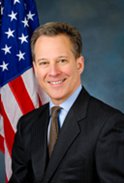(photo from NYS Senate website)
A long-time advocate on reform issues, Eric Schneiderman hopes to utilize his legal expertise obtained as a public interest lawyer and state senator to leverage the attorney general’s office to restore public confidence in both government and the state’s large public and private institutions. Schneiderman, a state senator representing parts of Washington Heights and Riverdale since 1998, believes the state is at a critical juncture where a window of opportunity exists to achieve significant reform. Having been at the center of the peaks and valleys of the reform movement over the last two decades, Schneiderman casts himself as best suited to take advantage of that opportunity to meaningfully reshape Albany through the attorney general’s office.
More than any other candidate in the race for attorney general, Schneiderman has experienced firsthand the dysfunction of Albany. Mired in the Democratic minority in the senate for a decade, Schneiderman conveyed how “collegiality at the expense of the public interest” relegated his service to introducing bills that went nowhere. Schneiderman indicated how he refused to accept the status quo arrangement in the legislature, taking action by launching a coup against the Democratic minority leader that elevated David Paterson to the top position among the Democrats in the senate. Consequently, Schneiderman’s district’s boundaries were drawn to bring about his electoral defeat. Instead, Schneiderman and the Democrats took the majority in the senate in 2008.
According to Schneiderman, this legislative experience has shaped his understanding of the imperative for an independent redistricting process along with a host of other reforms. He counts as among his most significant accomplishments the rules reform in 2009 that allowed for rank and file members of the senate to more easily put bills on the floor and on committee agendas, something they previously had virtually no ability to do in a system that continues to be largely dominated by a strong leader. Schneiderman also cites his leadership of the bipartisan committee that expelled Senator Hiram Monserrate following his misdemeanor conviction for domestic violence as indicative of his commitment to changing behavior in Albany.
As attorney general, Schneiderman believes he can apply the authority of the office to more effectively continue the ongoing struggle for reform. His ideas include aggressively expanding use of the False Claims Act, which Schneiderman strengthened in the legislature this past session, to engage whistleblowers to hold those accountable who defraud the state or local governments. If elected, Schneiderman will also place a public integrity officer in each regional office of the attorney general to root out local wrongdoing. Schneiderman is also a forceful advocate for pushing the governor to grant original jurisdiction to the attorney general to investigate and prosecute political corruption cases, showing zeal on the issue that was matched by few of his competitors. He also intends to push the many reforms he advocated for in the legislature through the attorney general’s bully pulpit and ability to introduce program bills, including public financing of campaigns and giving the attorney general the ability to permanently enforce election and campaign finance law.
Beyond government reform issues, Schneiderman plans to closely monitor dramatic changes at the federal level related to health care and finance laws, and to weigh in on federal rules as they develop while keeping a close eye on the industry to ensure they play by the rules during a time of transition. He also stated that he would build on his experience related to criminal issues, establishing an Innocence Unit in the Criminal Division of the attorney general’s office. Schneiderman also drew on his own legal experience in proposing new efforts to extend the capacity of the office, utilizing more pro bono lawyers and decentralizing offices to less expensive localities throughout the state.
Citizens Union feels that Schneiderman has been a consistent and independent force for change in state government, regardless of whether he was in the minority or majority party in the State Senate. A champion for a more transparent and accountable government that treats all New Yorkers with dignity and respect, Senator Schneiderman has not just talked about reform these past few years, but forcefully – and at times successfully – challenged the status quo, even when there were political risks. As such, his experience in state government is not a liability, but a valuable source of knowledge to better navigate in an office with expanded powers to more greatly advance the reform agenda. Combined with his legal and law enforcement experience, Schneiderman should be able to effectively continue the expanding prestige and influence of the attorney general’s office, and use it to creatively bring change to a State in desperate need of it. While his competitors bring their own unique skills in what is a talented field of candidates, Citizens Union believes Schneiderman is the best of a well-qualified and skilled group. We prefer him in the primary for attorney general.
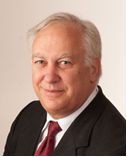
Age: 64
Occupation: Assembly member, NYS Assembly
Education: Brandeis (B.A.), Harvard Law School (J.D.)
Campaign website: http://www.richardbrodsky.com
Richard Brodsky, a long-time Assembly member, private-practice lawyer and former Westchester County legislator, is touting his many political accomplishments and successful lawsuits as being the right meld of experience and skill needed in the attorney general’s office. Brodsky believes that his sense of how to blend public pressure, artful compromise and legal challenge makes him best positioned to be a champion for governmental, social and economic reform as attorney general.
Brodsky, who has been in the assembly since 1982, has established a reputation as being one of the most intelligent and capable legislators as the chair of the committee on Corporations, Authorities and Commissions as well as through his previous leadership of the committees related to the environment, and oversight and investigation. Among his most notable achievements, Brodsky cites the recent passage of the Public Authorities Reform Act, which built on earlier reforms Brodsky initiated of these shadow government entities in 2005. Together, these reforms resulted in the creation of an Authorities Budget Office with subpoena power, independent authority directors with direct responsibility to the public, timely reporting of information, among other changes to management, auditing, and reporting processes. Authorities’ reform is seemingly emblematic of much of Brodsky’s legislative career and legal actions. From the New York Yankees to the MTA, Brodsky is adept at penetrating dense and complicated entities that make most legislators’ eyes glaze over, and exposing their wrongdoing to create accountability and transparency momentarily, if not through structural permanent reform.
Brodsky cites authorities’ reform as indicative of the type of results and reform he can achieve in the attorney general’s office through deft negotiating learned as a legislator and combining the threat of or actual legal action with the positing of what he calls, “yessable propositions.” He believes that the application of this approach to the attorney general’s office can achieve essential government and societal reforms, noting, “reform of state government does not require novel approaches. The failure of the reform movement in recent years …is a consequence of inadequate and misapplied political activities and skills.” Brodsky suggests that process is more important than new powers gained for the office or concrete proposals but as for achieving specific reforms, Brodsky believes most need to be done through constitutional amendments through the legislature like changing the state’s budget process, redistricting, elections and monitoring, and enforcement of ethics. He foresees a coming struggle between the legislative and executive branch over powers related to the budget process, and thinks as attorney general that he can play an influential role as a neutral independent arbiter between the two.
Aside from governmental reform, Brodsky wants to use the attorney general’s power to investigate non-profits to change the way energy is bought and sold through the state’s non-profit Independent Systems Operator to save consumers 15 to 20 percent on energy bills monthly. This proposal dovetails with Brodsky’s historical focus on environmental reform, something he has addressed in bringing lawsuits and passing legislation to clean up the Hudson River and holding the Indian Point nuclear facility to account in Westchester. Brodsky has also tackled the ever-changing world of technology and its impact on people’s privacy. He is proposing creating a special privacy task force within the AG’s office in addition to proposals to create a registry modeled on the “Do Not Call” registry that would allow internet users to opt out of tracking commonly used for advertising purposes.
Citizens Union was very impressed with Brodsky’s vision for how to best leverage the office of attorney general to achieve change, and his foresight on upcoming challenges related to the budget process. Authorities reform is indicative of his commitment and success in achieving reform as well as his ability to penetrate issues often abandoned due to their complexity. His recent proposal tackling energy pricing shows his creative thinking applied to the office of attorney general.
He is one of the strongest candidates among an exceptional group, but Citizens Union feels his experience in building coalitions and advocating for our broader reform agenda is exceeded by Senator Eric Schneiderman. Should he not win election as attorney general, Albany will be all the poorer for not having Brodsky in the legislature, where he is a natural talent and effective reformer.
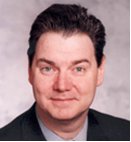
SEAN COFFEY – DEM
(photo from observer.com)
Sean Coffey’s Questionnaire
Age: 54
Occupation: Attorney;
Education: U.S. Naval Academy (B.S.), Georgetown University Law Center (J.D.)
Campaign website: http://coffey2010.com
Sean Coffey, no stranger to public service as a former Naval officer and Assistant U.S. Attorney in the Southern District of New York, emphasizes his status as a true political outsider who has never held office. He has been politically involved in Washington, D.C. think tanks and in supporting candidates for federal office as well. More recently, he was on President Obama’s litigation team. Coffey is self-financing a significant part of his campaign, although he raised $1.5 million first to prove his viability. Like many of his fellow candidates, he believes that state government is badly broken and would like to be the catalyst for reform in Albany. Having completed his naval service, he hopes to continue public service by applying his diverse legal experience as attorney general.
Coffey has a broad and ambitious slate of reform issues he wishes to pursue if elected. With no experience in Albany as an elected official or in state government and having largely self-funded his campaign, he believes he is best situated to strongly drive the reform agenda. He would focus on reforms such as redistricting, public financing for the Offices of the Comptroller and Attorney General, obtaining original jurisdiction for the attorney general to investigate public corruption, merit selection of judges, an independent ethics committee, and reduction in the number of petition signatures and petition challenges. Admitting that some of these efforts are outside the primary purview of the attorney general, he cites reform and watching Wall Street as the broad themes of his policy goals. Despite some of the current limitations on the attorney general, Coffey is willing to use whatever authority and powers the office currently provides. For example, he finds the Tweed Law suboptimal, but would be more aggressive in its application. He also hopes to cut “public corruption taxes” for back-room dealings and strengthen the False Claims Act. Together, these efforts would result in trying more cases.
Coffey views the relationship between the attorney general and the governor as a partnership, particularly when it comes to reform issues; if the governor is unwilling to take the lead or press issues strong enough, as attorney general he will fill the void and ensure reform is a priority. To obtain original jurisdiction for the attorney general’s office, Coffey would lobby the governor. Should that fall short, he would seek the power through passing legislation.
To protect economically vulnerable consumers from predatory lenders, Coffey would begin by identifying the perpetrators, then testing cases. He recalls certain points in his childhood when his family struggled with unemployment, and is genuinely sympathetic to these victims. For recovering funds of Medicaid fraud, Coffey views the issue as not directly related to the attorney general’s office. Yet he adds that precautionary measures can be taken, such as scrutinizing its relationship to the Office of the Medicaid Inspector General.
Addressing concern over he and his firm’s previous contributions to candidates, particularly comptrollers, across many states, Coffey assures Citizens Union that the donations were all legal and that he mostly gave to federal candidates who support his beliefs. On measures to prevent lawyers from making contributions to firms whose cases they may be working on, Coffey would consider such prohibitions. Referring to such possible conflicts of interest and misconceptions about his own contributions, he urges public financing of all offices, starting with those of the comptroller and attorney general, to remove the appearance, if not the practice, of undue influence by contributors. Coffey also notes that some of his supporters include those who opposed him in court in his previous positions, and that this is recognition of his integrity and professionalism within the legal community.
Citizens Union believes Coffey, though a newcomer to running for office, is nonetheless a dynamic and focused candidate. Citizens Union is pleased with the way he has embraced the reform agenda and prioritized it in his campaign, and by extension made it more visible in the public debate. His service to the country, work as a trial lawyer, and grasp of the issues suggest he could be a strong attorney general. Citizens Union’s decision not to prefer Coffey was due in part to our concern over the disconnect created by he and his firm’s legal political contributions made to comptroller candidates across the country and in New York – some of whom later awarded state contracts to his firm – and his pledge to reduce the influence of money in politics in Albany.
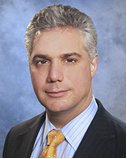 ERIC DINALLO – DEM
ERIC DINALLO – DEM
(photo from nydailynews.com)
Eric Dinallo’s Questionnaire
Age: 46
Occupation: Kaufman Visiting Professor of Finance, NYU Stern School of Business
Education: Vassar College (B.A.), Duke University (M.A.), NYU (J.D.)
Campaign website: http://www.ericdinallo.com
Eric Dinallo highlights his long service as former New York State Superintendent of Insurance and Assistant Attorney General in distinguishing himself as the best candidate. Dinallo cites his skill set learned from these positions and the current political and financial crises as reasons why he is running for attorney general.
Dinallo believes he is best suited for attorney general given his track record of success in senior level positions in state agencies and offices achieved through an apolitical and dispassionate approach. Dinallo is emphatic that much of the campaign for attorney general has focused on areas tangential to the actual work of the office, which largely involves defending state government. Dinallo believes that creativity within the existing structure and law is what is most important for success, indicating his knowledge of the Tweed Law, and Martin and Donnelly Acts, for example, will be levers for taking action to bring about change, rather than through program bills that must wind their way through the legislature. He does, however, believe that the law should be changed to allow the attorney general to have original jurisdiction in public corruption cases and his efforts to obtain it from the current governor have been second to none. To assure his independence from whomever is governor, Dinallo was the first candidate to say that he agreed with the current attorney general and gubernatorial candidate Andrew Cuomo’s New York Agenda, but would not sign his pledge, arguing that it was inappropriate for an attorney general hopeful to sign such a pledge.
Dinallo would place assistant attorney generals in each county to assist the office in being more responsive to local needs. If elected, Dinallo would focus on civil rights issues, which he feels have not been as strongly emphasized as they could be under the attorney general’s office. He hopes to combat housing discrimination and to look more closely into stop and frisk cases. Despite the success of stop and frisk in decreasing gun possession, Dinallo thinks that the practice today has turned into police enforcement, warranting enough cause for an investigation. Dinallo also plans to use the office more as a consumer protector. To combat predatory lenders who target the economically vulnerable, Dinallo wants to confront the banks through powers granted by the federal government to attorneys general to act against such lenders. Dinallo also would target mortgage brokers who are involved in predatory lending schemes.
Dinallo envisions simplifying the structure of the attorney general’s office and increasing diversity. Although the office is still accessible, Dinallo has seen it become more top-heavy over the years. He would like the office to more closely resemble the model of the U.S. Attorney’s office in the Southern District of New York. He also feels that the staff in the office can be more diverse. To recruit personnel from a broader and fresher pool, he would consider eliminating the two-year practice rule, which requires that all staff members have at least two years of legal experience.
Dinallo is first to admit that he is not a great, smooth-talking politician but sees this as an asset. He notes his independence, and his responsible use of the power he had while in government, which he said he never used for political purposes. Dinallo has no intentions of seeking higher office through the position of attorney general. He has both private and public sector experience that will no doubt aid in his work in the attorney general’s office. His approach of viewing the office internally and working within its existing system to bring it closer to New Yorkers distinguishes him from his competitors as well. Citizens Union found Dinallo knowledgeable and thoughtful, and valued greatly his familiarity with the office. With a track record in leading an agency as Superintendent of Insurance during a time of great financial tumult when a smart mind and steady hand were needed, Dinallo also possesses significant management skills that would also serve him well should he win.
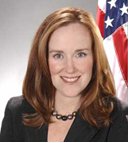 KATHLEEN RICE – DEM
KATHLEEN RICE – DEM
(photo from nassaucountyny.gov)
Kathleen Rice’s Questionnaire
Age: 45
Occupation: District Attorney of Nassau County, NY
Education: The Catholic University of America (B.A.), Touro Law School (J.D.)
Campaign website: http://www.kathleenrice.com
The only woman in field of five, Kathleen Rice distinguishes herself not only as the female candidate for attorney general but also as a 19-year legal advocate, having served as an assistant district attorney in New York City, a homicide prosecutor in Brooklyn, an assistant United States attorney, and currently as the District Attorney of Nassau County. She believes her political independence, never having been a legislator in Albany or a player on Wall Street, makes her best suited to reform state government and police Wall Street. She is passionate about being a public servant more than a politician, achieving legal outcomes that benefit the general public.
As attorney general, Rice would pursue reforms that require full financial disclosure of outside income from state elected officials including lawyers’ outside clients, establishing independent redistricting to end gerrymandering and “superincumbency”, and creating an independent state ethics commission. She would also strengthen campaign finance laws—significantly lowering contribution limits for individuals and businesses, outlawing contributions from companies that do business with the state, and introducing a public financing system. On issues more closely aligned with the scope of the office, Rice would ask the governor for permission for independent attorney general jurisdiction of public corruption cases. If the governor denied that permission, she would pursue a legislative fix to obtain the permission. Rice also indicated she would use the Tweed Law to go after the misuse of public funds.
Drawing on her experience, Rice casts herself as a people’s advocate. In her current office, she has investigated public corruption, reduced crime by targeting drug markets, combated internet crime, and was the first DA in the nation to found a Medicaid Fraud Office to save the county money. Rice also pointed to her dark horse candidacy that defeated a 30-year Republican incumbent for Nassau District Attorney and later retaining the seat when other Democrats such as County Executive Tom Suozzi were ousted as further evidence of her support from a wide, diverse set of people across the state.
Rice, who failed to vote for 18 consecutive years before casting her first vote in 2002, described her lack of voting as a youthful indiscretion that she deeply regrets. She said she has voted in every election since, including primaries, evidence that she has learned from her errors. She feels that people shouldn’t be unduly jeopardized by past mistakes. She stated that after 9/11 as a federal prosecutor, she became more engaged in the political process. Now she strives to help people with little faith to become empowered to speak up on issues, to realize that being politically active can be a way to achieve civil rights and social justice.
According to Rice, “good judgment” is the single most important quality an attorney general must possess. She used two examples to illustrate her record of good judgment. As Nassau County district attorney, she took legal action against Walmart, against the advice of others, where a worker was trampled by shoppers. Rice ultimately reached a historic agreement with Walmart that forced them to implement new safety plans for all their stores in New York, safety plans that were ultimately adopted across the nation. When an 18-year old girl falsely claimed that she was gang-raped, Rice as District Attorney got the girl to admit her fabrication and undergo mental health treatment and community service rather than be prosecuted or arrested.
Citizens Union was impressed by Ms. Rice’s examples of good judgment, her overall thoughtful and clear presentation, and her ability to connect her experience and accomplishments to how she would be a successful attorney general, Citizens Union, however, found it difficult as a good government group to back her given her absence from voting throughout much of her adult life. Her answer to why she did not vote for eighteen years did not dissuade us of our belief that a candidate for statewide office should be setting a strong example for consistent civic responsibility. We also felt there are other candidates in the race who expressed a stronger commitment to seek and obtain from the governor the power to handle public corruption.

